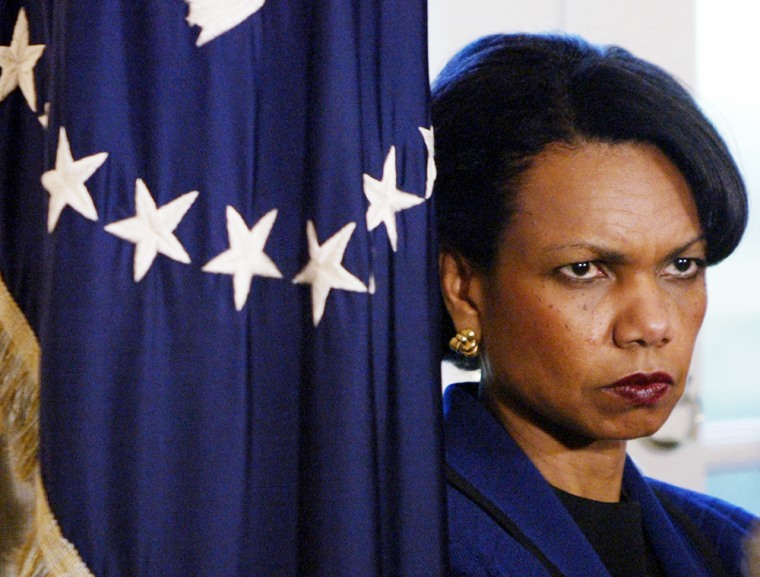When national security adviser Condoleezza Rice finally testifies Thursday before the 10 members of the 9/11 commission, she will be performing in a time-worn Washington ritual: A long-anticipated witness appears on stage at a hearing televised live, surrounded by a throng of still photographers.
Thousands of words will have already been written in anticipation about how the panel members will grill her on inconsistencies in her past comments and between her recollections and the testimony of her former counterterror assistant, Richard Clarke.
By the time she finishes, illuminated by another burst of strobes from the gaggle of photographers, will the American people have a better understanding of what went wrong?
If past hearings — from Iran-contra to the confirmations of Robert Bork, Clarence Thomas and proposed Bush I Defense Secretary John Tower — are any guide, perhaps, but not likely.
Plenty of outstanding questions
Not that there aren’t a lot of questions to raise, and answer.
Commission leaders want to better understand why it took the new Bush administration 7½ months to come up with a counterterror policy and whether it was a dramatically different action plan, as Rice has claimed, or simply a repackaged Clinton doctrine.
What about a foreign policy manifesto Rice had planned to deliver on that fateful Sept. 11: Did it fail to mention terrorism or al-Qaida, as has been reported? The White House has refused to release the undelivered text.
How high a priority was Osama bin Laden on the new Bush team’s to-do list?
Why was Clarke sidelined to an auxiliary office studying the threat of cyber-terror, leaving less experienced operatives working on the more pressing question of al-Qaida? Can the Bush White House refute Clarke’s claim, admittedly subjective, that the Bush team considered terrorism “important” but not “urgent”?
Were there, in fact, 100 National Security Council meetings before 9/11 but only one devoted to terrorism, as Clarke also testified?
Challenges for Rice
Rice will argue forcefully that she did not ignore dire warnings from Clarke. Presumably, she will arrive with a virtual suitcase of White House documentation — memos, e-mails, agenda items — all attesting to how hard the new team worked to avoid a terror attack on the homeland.
Her challenge will be to reconcile past statements that no one ever considered the hypothetical possibility of terrorists’ using airplanes to attack domestic targets with reports that the president was briefed on Aug. 6, 2001, at his Texas ranch about precisely that possibility.
And if using hijacked airplanes as a weapon had never been imagined, why did national security planners defend against that contingency when planning the 1996 Olympics in Atlanta?
Another question may revolve around George Bush’s own statement to The Washington Post’s Bob Woodward — during an interview for his book “Bush at War” — that before 9/11, in Woodward’s recollection, the president felt Bin Laden was not his focus or that of his national security team. Woodward then quotes the president as saying there was “a significant difference after Sept. 11.”
Then there are the issues that pit former Clinton advisers, like Madeleine Albright, Samuel Berger and William Cohen, against Rice, Secretary of State Colin Powell and Defense Secretary Donald Rumsfeld.
Just when did the CIA and the FBI determine that al-Qaida was responsible for the September 2000 bombing of the USS Cole in Yemen? Before or after the transition to the Bush presidency?
If it was after Bush took office, as Albright and Berger claim, the Clinton team can hardly be blamed for failing to retaliate. But if the perpetrators were identified before Clinton left office, as Bush partisans insist, that would bolster Rice’s contention that the Bush team inherited an ineffectual policy.
Character play
Washington loves character plays, and both Condi Rice and Richard Clarke more than meet the dramatic requirements of any stage director. But when she steps into the spotlight on Thursday morning, one wonders whether her performance will resemble Oliver North’s when he upstaged his interrogators and stole the show on Capitol Hill.
Rice is nothing if not well schooled, disciplined and precise. Countless interviewers have found it difficult to penetrate her steely shield.
Some of her questioners on the commission may feel intimidated, reluctant to get tough or combative against a potentially sympathetic witness. And she could still refuse to answer some questions if they probe too deeply on undisputed areas of executive privilege, her private counsel to the president.
The commission has interviewed thousands of witnesses and accumulated millions of pages of testimony. With the exception of occasional partisan lapses, most of the questioning has reflected serious study of the evidence so far.
The test Thursday will be whether they are willing or able, format permitting, to dig beyond what is already known from Rice’s many television interviews to get more than a brittle account of the Bush record.
It will depend on whether the commission members and the national security adviser are willing or able to ignore partisan advantage to help America better understand what went wrong, and why, on Sept. 11, 2001.
